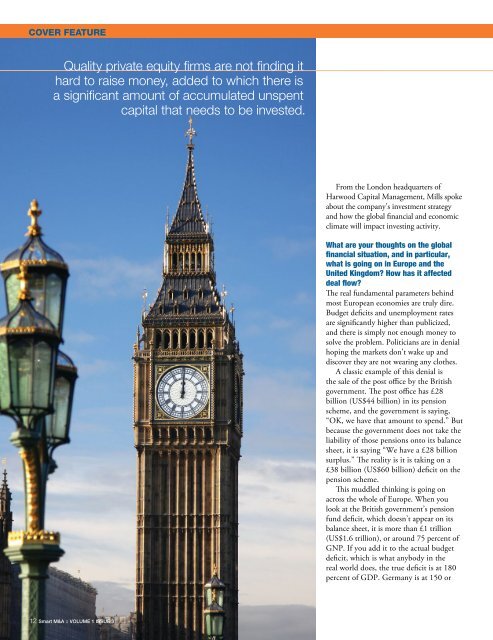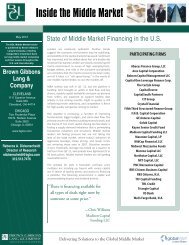PDF 3151KB - Brown Gibbons Lang & Company
PDF 3151KB - Brown Gibbons Lang & Company
PDF 3151KB - Brown Gibbons Lang & Company
You also want an ePaper? Increase the reach of your titles
YUMPU automatically turns print PDFs into web optimized ePapers that Google loves.
COVER FEATURE<br />
Quality private equity firms are not finding it<br />
hard to raise money, added to which there is<br />
a significant amount of accumulated unspent<br />
capital that needs to be invested.<br />
12 Smart M&A :: VOLUME 1 ISSUE 3<br />
From the London headquarters of<br />
Harwood Capital Management, Mills spoke<br />
about the company’s investment strategy<br />
and how the global financial and economic<br />
climate will impact investing activity.<br />
What are your thoughts on the global<br />
financial situation, and in particular,<br />
what is going on in Europe and the<br />
United Kingdom? How has it affected<br />
deal flow?<br />
The real fundamental parameters behind<br />
most European economies are truly dire.<br />
Budget deficits and unemployment rates<br />
are significantly higher than publicized,<br />
and there is simply not enough money to<br />
solve the problem. Politicians are in denial<br />
hoping the markets don’t wake up and<br />
discover they are not wearing any clothes.<br />
A classic example of this denial is<br />
the sale of the post office by the British<br />
government. The post office has £28<br />
billion (US$44 billion) in its pension<br />
scheme, and the government is saying,<br />
“OK, we have that amount to spend.” But<br />
because the government does not take the<br />
liability of those pensions onto its balance<br />
sheet, it is saying “We have a £28 billion<br />
surplus.” The reality is it is taking on a<br />
£38 billion (US$60 billion) deficit on the<br />
pension scheme.<br />
This muddled thinking is going on<br />
across the whole of Europe. When you<br />
look at the British government’s pension<br />
fund deficit, which doesn’t appear on its<br />
balance sheet, it is more than £1 trillion<br />
(US$1.6 trillion), or around 75 percent of<br />
GNP. If you add it to the actual budget<br />
deficit, which is what anybody in the<br />
real world does, the true deficit is at 180<br />
percent of GDP. Germany is at 150 or









